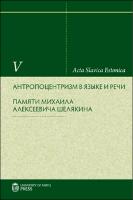Антропоцентризм в языке и речи
| dc.contributor.editor | Külmoja, Irina | |
| dc.date.accessioned | 2022-02-23T11:22:42Z | |
| dc.date.available | 2022-02-23T11:22:42Z | |
| dc.date.issued | 2014 | |
| dc.identifier | ONIX_20220223_9789949327355_10 | |
| dc.identifier | ONIX_20220223_9789949327355_10 | |
| dc.identifier | OCN: 1308759754 | |
| dc.identifier.issn | 2228-2335 | |
| dc.identifier.uri | https://library.oapen.org/handle/20.500.12657/53124 | |
| dc.language | Russian | |
| dc.language | Czech | |
| dc.language | Slovak | |
| dc.language | Estonian | |
| dc.relation.ispartofseries | Acta Slavica Estonica | |
| dc.subject.classification | thema EDItEUR::C Language and Linguistics::CF Linguistics | en_US |
| dc.subject.classification | thema EDItEUR::C Language and Linguistics::CJ Language teaching and learning | en_US |
| dc.subject.classification | thema EDItEUR::2 Language qualifiers::2A Indo-European languages::2AG Slavic (Slavonic) languages | en_US |
| dc.subject.other | anthropocentrism | |
| dc.subject.other | language | |
| dc.subject.other | speech | |
| dc.subject.other | linguistics | |
| dc.subject.other | word-formation | |
| dc.subject.other | grammar | |
| dc.subject.other | phraseology | |
| dc.subject.other | lexical system | |
| dc.subject.other | contrastive studies | |
| dc.subject.other | translation | |
| dc.subject.other | teaching of foreign languages | |
| dc.subject.other | Russian | |
| dc.title | Антропоцентризм в языке и речи | |
| dc.type | book | |
| oapen.abstract.otherlanguage | Acta Slavica Estonica is an international series of publications on current issues of Russian and other Slavic languages, literatures and cultures. The volume „Anthropocentrism in language and speech” was prepared in memory of Mikhail Shelyakin (1927–2011), a long-time professor of the Russian language at the University of Tartu. The relation between language and the human being was M. Shelyakin’s central topic during the final period of his research. The articles focus on anthropocentrism of the linguistic sign and its realization in speech. They continue and develop the problems studied by M. Shelyakin mainly on the basis of Russian. The volume consists of three parts: anthropocentrism in word-formation and grammar, anthropocentrism in phraseology and the lexical system, and the impact of anthropocentrism on contrastive studies, translation, and the teaching of foreign languages. | |
| oapen.relation.isPublishedBy | fed215d9-bf7f-466c-a9f3-5510b4847c64 | |
| oapen.relation.isbn | 9789949327362 | |
| oapen.series.number | 5 | |
| oapen.pages | 368 | |
| oapen.place.publication | Tartu |

